- 1 I. Introduction: The Current State and Challenges of Sludge Treatment
- 2 II. What is a Screw Press Sludge Dewatering Machine?
- 3
- 4 III. Why Choose a Screw Press Sludge Dewatering Machine?
- 5 IV. Applications of the Screw Press Sludge Dewatering Machine in Different Fields
- 6 V. How to Choose the Right Screw Press Sludge Dewatering Machine?
- 7 VI. Conclusion: The Screw Press Sludge Dewatering Machine—The Mainstay of Future Sludge Dewatering Equipment
- 8
- 9 FAQs (Frequently Asked Questions)
- 9.1 1. What types of sludge are suitable for the Screw Press Sludge Dewatering Machine?
- 9.2 2. Why choose Yangzhou Qinxin Environmental Protection Technology Co., Ltd.?
- 9.3 3. What are the significant advantages of the Screw Press Sludge Dewatering Machine compared to other **sludge dewatering equipment**?
I. Introduction: The Current State and Challenges of Sludge Treatment
In the age of rapid urbanization and industrialization, the **dewatering of municipal sludge** has become an increasingly urgent and critical environmental issue. Sludge, an inevitable byproduct of wastewater treatment, is growing in volume. Without proper treatment, it not only consumes vast land resources but also causes secondary pollution to soil and water, posing a serious threat to the ecosystem and public health.
Traditional sludge treatment methods, such as natural drying, incineration, or landfill, have significant drawbacks. Natural drying is time-consuming, land-intensive, and weather-dependent. Incineration, while effective in volume reduction, is costly to build and operate and can produce harmful substances like dioxins. Direct landfilling, on the other hand, leads to leachate pollution and a waste of valuable land resources. These challenges have driven the industry to seek more efficient, economical, and eco-friendly **sludge treatment** solutions.
It is in this context that the **Screw Press Sludge Dewatering Machine** has emerged. With its unique operating principle and significant technical advantages, it represents a revolutionary breakthrough in conventional **sludge dewatering equipment**.
| Parameter Comparison | Screw Press Sludge Dewatering Machine | Traditional Plate and Frame Filter Press |
|---|---|---|
| Operating Mode | Continuous operation, high automation | Batch operation, requires manual intervention |
| Energy Consumption | Low | High |
| Footprint | Compact, small footprint | Large, especially with auxiliary equipment |
| Cleaning Frequency | Automatic cleaning, low frequency | Difficult to clean, high frequency |
| Filter Clogging | Clogging-resistant, self-cleaning | Prone to clogging, requires manual cleaning |
| Maintenance Cost | Low | High |
| Sludge Applicability | Broad, excels with oily and sticky sludge | Strict requirements on sludge properties, prone to mud leakage |
II. What is a Screw Press Sludge Dewatering Machine?
The **Screw Press Sludge Dewatering Machine** is a new type of **sludge dewatering equipment** that integrates thickening and dewatering based on the principle of a **screw press**. Its design philosophy overturns traditional batch operations, enabling continuous and automated sludge processing.
The core of the machine consists of a slowly rotating screw shaft, multiple fixed rings, and moving rings. As sludge enters the machine from the inlet, it is continuously compressed by the propulsion of the screw shaft, while water is filtered out through the tiny gaps between the fixed and moving rings.
This unique structural design provides two main working principles:
1. The Concentration Zone
Before entering the dewatering section, the sludge is first pre-thickened by the screw shaft's propulsion. The pitch of the screw blades gradually decreases, and the resistance from the back pressure plate increases, squeezing out free water and significantly reducing the sludge's moisture content.
2. The Dewatering Zone
As the sludge moves forward, the changing pitch and screw shaft diameter create continuous pressure within the screw cavity. Under the powerful screw pressing force, capillary water and interstitial water are thoroughly squeezed out, achieving deep dewatering.
Compared to other **sludge filter presses**, the **Screw Press Sludge Dewatering Machine**'s unique feature is its self-cleaning ability. The slow rotation of the screw shaft causes the moving rings to move up and down, continuously clearing the gaps between the fixed and moving rings. This effectively prevents clogging and ensures long-term stable operation without the need for frequent manual cleaning.
| Core Component | Function | Technical Characteristics |
|---|---|---|
| Screw Shaft | Propels sludge, generates compression force | Special design, anti-sticking, wear-resistant |
| Fixed Rings | Form the filtration channel, remain stationary | Ensures precise filtration gaps |
| Moving Rings | Moves with the screw shaft, enables self-cleaning | Prevents clogging, improves efficiency |
| Back Pressure Plate | Adjusts outlet pressure | Controls the solid content of the discharged cake, flexible and adjustable |
Waste Water Treatment Eco-friendly Spiral Screw Sludge Dewatering Machine QXDL-304
III. Why Choose a Screw Press Sludge Dewatering Machine?
Choosing a **Screw Press Sludge Dewatering Machine** is not just about selecting a piece of **sludge dewatering equipment**; it's about opting for an efficient, economical, and eco-friendly comprehensive solution. It demonstrates unparalleled performance in the field of **sludge treatment** thanks to its unique technical advantages.
1. High-Efficiency Dewatering and Superior Performance
The core advantage of the **Screw Press Sludge Dewatering Machine** is its outstanding dewatering capability. Utilizing the **screw press** principle, it can significantly reduce the sludge's moisture content through continuous and stable compression. This not only dramatically decreases the volume and weight of the sludge, thereby reducing subsequent transportation and disposal costs, but also allows it to meet standards for resource recovery or safe disposal.
| Performance Parameter Comparison | Screw Press Sludge Dewatering Machine | Traditional Belt Filter Press |
|---|---|---|
| Dewatered Moisture Content | Typically reaches 70-85% | Typically around 80-90% |
| Processing Capacity | Continuous and stable, little affected by feed concentration | Fluctuating flow, highly affected by feed concentration |
| Solids Recovery Rate | High, can exceed 95% | Relatively low, small solids are easily lost |
2. Energy-Saving, Eco-Friendly, and Low Operating Costs
Compared to many conventional **sludge filter presses**, the **Screw Press Sludge Dewatering Machine** is excellent in terms of energy consumption. It uses a low-speed screw shaft drive with a small motor power and is highly automated, requiring minimal manual labor, which significantly reduces labor costs. Furthermore, its sealed operation effectively reduces odor emission, improving the working environment.
| Operating Cost Comparison | Screw Press Sludge Dewatering Machine | Traditional Centrifugal Dewatering Machine |
|---|---|---|
| Power Consumption | Extremely low (about 1/20 of a centrifuge) | High |
| Water Consumption | Extremely low, only for minor cleaning | High, large amounts of flushing water |
| Chemical Dosage | Relatively low, typically over 20% less than a centrifuge | High |
| Noise Level | Low | High |
3. Broad Applicability and Simple Operation
The **Screw Press Sludge Dewatering Machine** is highly adaptable to various types of sludge. Whether it's **municipal sludge dewatering** at urban wastewater treatment plants or sludge containing oil, high viscosity, or low concentration from industrial sectors, it can handle them effectively. Thanks to its unique self-cleaning function, it effectively solves the problem of filter cloth clogging, ensuring long-term stable operation. The machine's user-friendly interface allows for one-button start/stop and unmanned operation, greatly simplifying the process.
In summary, choosing a **Screw Press Sludge Dewatering Machine** is a wise move when facing the severe challenges of **sludge treatment**, as it is a solution that is technically advanced, economically viable, and environmentally friendly.
IV. Applications of the Screw Press Sludge Dewatering Machine in Different Fields
Thanks to its excellent performance and wide applicability, the **Screw Press Sludge Dewatering Machine** has become a core solution for **sludge treatment** in various industries. It not only excels in the field of **municipal sludge dewatering** but also plays an irreplaceable role in numerous industrial production processes.
1. **Municipal Sludge Dewatering**: The Guardian of Urban Environments
In urban wastewater treatment plants, the volume of sludge is enormous and its composition is complex. Traditional **sludge filter presses** often face issues such as limited capacity, large footprint, and cumbersome maintenance. The **Screw Press Sludge Dewatering Machine**, with its compact design and continuous operation, perfectly aligns with the urban demand for efficient and integrated treatment.
Application Advantages:
- Efficient Volume Reduction: By deep dewatering, it reduces sludge moisture content to 70%-85%, significantly cutting down on sludge volume and transportation costs.
- Automated Operation: It allows for 24-hour unmanned operation, reducing labor input and improving management efficiency.
- Low Noise and Odor-Free: The enclosed design effectively controls odors and noise during operation, improving the plant environment.
2. Industrial **Sludge Treatment**: The Terminator of Complex Sludge
Sludge from many industrial processes has a complex composition; some are high in oil, others are highly viscous, posing a severe challenge to traditional **sludge dewatering equipment**. The unique screw press structure of the **Screw Press Sludge Dewatering Machine** demonstrates unparalleled advantages in treating these special types of sludge.
- Petrochemical Industry: In the treatment of oily sludge, the machine effectively separates the oil, water, and solid phases, recovering valuable materials and reducing environmental pollution.
- Food Processing Industry: For organic sludge like fruit and starch residues, the machine achieves high-efficiency dewatering, facilitating subsequent resource recovery.
- Papermaking and Dyeing Industries: This type of sludge is high in fiber and highly viscous, which easily clogs traditional equipment. The self-cleaning function of the **Screw Press Sludge Dewatering Machine** effectively prevents this problem, ensuring continuous production.
| Application Field Comparison | Municipal Sludge | Industrial Sludge (e.g., oily, high-viscosity sludge) |
|---|---|---|
| Sludge Characteristics | Low solid content, high organic matter, moderate viscosity | Varying solid content, may contain oil, fiber, or heavy metals, high viscosity |
| Treatment Challenges | Large volume, requires continuous and stable operation | Complex sludge properties, prone to clogging, requires high corrosion resistance |
| Machine Performance | Continuous stable operation, good dewatering effect, easy to operate and maintain | Excellent anti-clogging ability, low discharged cake moisture content, effectively handles complex conditions |
V. How to Choose the Right Screw Press Sludge Dewatering Machine?
Selecting the right **Screw Press Sludge Dewatering Machine** is key to a successful **sludge treatment** project. It's not just about the machine's processing capacity but also a comprehensive consideration of sludge characteristics, operating costs, and after-sales service. Here are a few important factors to help you make an informed decision.
1. Match Based on Sludge Characteristics
Sludge properties vary greatly, including solid content, viscosity, oil content, and fiber content. These factors directly affect the machine's dewatering performance and efficiency. A professional **sludge dewatering equipment** manufacturer will recommend the most suitable model based on your sludge sample or detailed parameters.
- Oily Sludge: Choose models with special screw designs and anti-clogging features to ensure the oily mixture can pass through smoothly and be dewatered effectively.
- High-Viscosity Sludge: Select a machine with a more reasonable inlet design and a wider screw blade pitch to prevent sludge buildup and clogging.
- Low-Concentration Sludge: Some machines have an extended concentration zone that can pre-thicken low-concentration sludge before dewatering, thereby improving overall efficiency.
2. Evaluate Key Performance Parameters
When selecting a **screw press**, besides the basic processing capacity, you need to delve into the following key performance parameters, as they directly relate to the machine's operational efficiency and economy.
| Performance Parameter | Key Focus | Why It Matters |
|---|---|---|
| Processing Capacity (m³/h) | Rated capacity and actual performance | Ensures the machine can meet your daily treatment needs. |
| Dewatered Moisture Content (%) | The lowest moisture content the machine can achieve | Determines the cost of subsequent sludge transportation and disposal. The lower the moisture content, the lower the cost. |
| Energy Consumption (kW) | Power consumption during operation | Directly relates to long-term electricity costs, a major component of operating costs. |
| Filtrate Solid Content (%) | The solid particles in the discharged liquid | The clearer the filtrate, the better the dewatering effect, avoiding secondary pollution. |
| Material Selection | Material of the screw shaft, rings, etc. | Determines the machine's corrosion and wear resistance, affecting its service life. |
3. Pay Attention to Operation and Maintenance
While the **Screw Press Sludge Dewatering Machine** is known for low maintenance, you should still evaluate whether its design is truly easy to maintain. For example, the effectiveness of the self-cleaning function and the convenience of component replacement. Additionally, professional manufacturers typically provide comprehensive after-sales service and technical support, which are crucial for the long-term stable operation of the equipment.
In summary, choosing the right **Screw Press Sludge Dewatering Machine** is a systematic decision that requires a comprehensive evaluation from multiple angles, including sludge characteristics, technical parameters, and long-term operation and maintenance costs, to find the **sludge dewatering equipment** that best suits your needs.
VI. Conclusion: The Screw Press Sludge Dewatering Machine—The Mainstay of Future Sludge Dewatering Equipment
With increasingly stringent environmental regulations and the growing awareness of sustainable development, traditional **sludge treatment** methods can no longer meet modern demands. In this context, the **Screw Press Sludge Dewatering Machine** is gradually becoming the mainstay of the future **sludge dewatering equipment** market due to its unique advantages. It is not just a machine but a product of the perfect integration of modern industry and environmental technology.
The success of the **Screw Press Sludge Dewatering Machine** stems from its comprehensive advantages in several key areas:
- Efficiency: It can reduce sludge moisture content to 70%-85%, significantly decreasing sludge volume and directly lowering subsequent transportation and disposal costs.
- Economy: Compared to traditional equipment, its low energy consumption, low water consumption, and low maintenance costs effectively control operational expenses.
- Intelligence: The automated, continuous operation design enables unmanned supervision, greatly improving management efficiency and reducing labor input.
- Applicability: Whether for **municipal sludge dewatering** or complex industrial sludge, it can handle them effectively, expanding its range of applications.
| Core Advantages | Screw Press Sludge Dewatering Machine | Other Traditional Dewatering Equipment |
|---|---|---|
| Operating Costs | Low (low electricity, water, and chemical consumption) | High (high electricity, water, and chemical consumption) |
| Automation Level | High (continuous, automatic operation, unmanned) | Low (batch operation, requires manual intervention, frequent maintenance) |
| Footprint | Small (compact structure, high integration) | Large (requires auxiliary equipment, large space needed) |
| Environmental Friendliness | High (enclosed operation, low noise, no odor) | Relatively low (open design, high noise, prone to odors) |
Looking ahead, with continuous technological advancements, the **Screw Press Sludge Dewatering Machine** will play an increasingly important role in the field of **sludge treatment**. Its emergence provides not only a more efficient and economical solution for enterprises but also makes a significant contribution to environmental protection. It represents the future direction of **sludge dewatering equipment**—smarter, more eco-friendly, and more efficient. It is foreseeable that in the future environmental industry, the **Screw Press Sludge Dewatering Machine** will become an indispensable core piece of equipment.
FAQs (Frequently Asked Questions)
1. What types of sludge are suitable for the Screw Press Sludge Dewatering Machine?
The **Screw Press Sludge Dewatering Machine** has broad applicability to sludge and can efficiently treat various types of sludge. It is not only suitable for **municipal sludge dewatering** at urban wastewater treatment plants but also excels at handling complex industrial sludge, such as:
- High-Oil Sludge: In industries like petrochemicals and food processing, the machine can effectively separate oil, water, and solids, avoiding the clogging issues that traditional equipment faces due to oil content.
- High-Viscosity Sludge: In industries like papermaking and dyeing, the machine’s unique screw press structure can effectively handle sludge with a high fiber content or high viscosity.
- Low-Concentration Sludge: Some models feature a thickening function, which can pre-thicken low-concentration sludge before deep dewatering, thereby improving overall processing efficiency.
Our **Screw Press Sludge Dewatering Machine**, a result of years of R&D and practical experience, is designed to meet the **sludge treatment** needs of various industries.
2. Why choose Yangzhou Qinxin Environmental Protection Technology Co., Ltd.?
Yangzhou Qinxin Environmental Protection Technology Co., Ltd. is an enterprise that combines industry and trade and is committed to research and development, and sales of environmental protection equipment. We provide professional **sludge treatment equipment** and solutions with our profound industry experience and strong technical expertise.
Our main products include **stacked screw sludge dewatering machines**, PAM integrated dosing devices, sludge low-temperature drying systems, solid-liquid separators, and other sewage treatment equipment, mainly serving the municipal, food, petrochemical, aquaculture, papermaking, leather, brewing, printing and dyeing, chemical, pharmaceutical, medical and other industries. Adhering to many years of practical experience and research and development in the production of environmental protection equipment, our company is AAA-level contract-oriented and trustworthy and has obtained a number of patents and quality management system certifications, environmental management system certifications, and occupational health and safety management system certifications. Since its establishment, the company has always adhered to a dedicated team as the foundation, supported by strong technical force, advanced service awareness as the goal, and a strict enterprise management process has won the trust of the majority of customers. Based on the high-grade and high-end market, our annual production equipment, mainly exported to Southeast Asian countries has become theirs in China. Sewage treatment equipment An important supplier.
3. What are the significant advantages of the Screw Press Sludge Dewatering Machine compared to other **sludge dewatering equipment**?
Compared to traditional **sludge dewatering equipment**, the core advantages of the **Screw Press Sludge Dewatering Machine** lie in its efficiency, energy savings, and automation.
- Low Operating Costs: Compared to a centrifugal dewatering machine, its power consumption is extremely low, often only one-tenth of the latter's, and it consumes almost no water for flushing, significantly reducing operating costs.
- High Level of Automation: The machine can operate continuously and automatically, eliminating the need for frequent manual operation and cleaning, which reduces labor input and maintenance costs.
- Low Dewatered Cake Moisture Content: Based on the **screw press** principle, it can reduce sludge moisture content to below 70%, significantly decreasing sludge volume and lowering transportation and disposal costs.
- High Environmental Friendliness: The machine's enclosed design results in low noise and no odor during operation, providing a safer and more comfortable working environment for operators.
These advantages make it stand out in a competitive market and establish it as a representative of the new generation of **sludge treatment** technology.

 ENG
ENG
 English
English русский
русский Español
Español Tiếng Việt
Tiếng Việt ไทย
ไทย
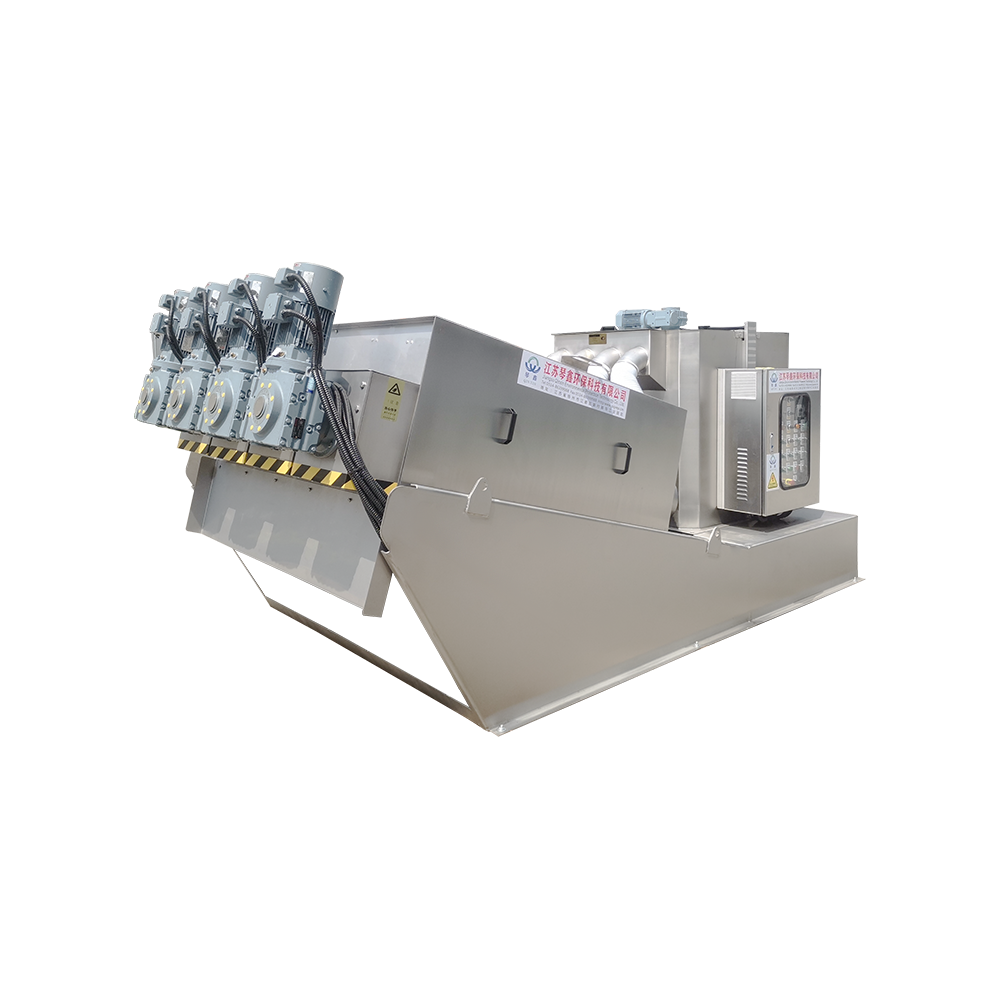
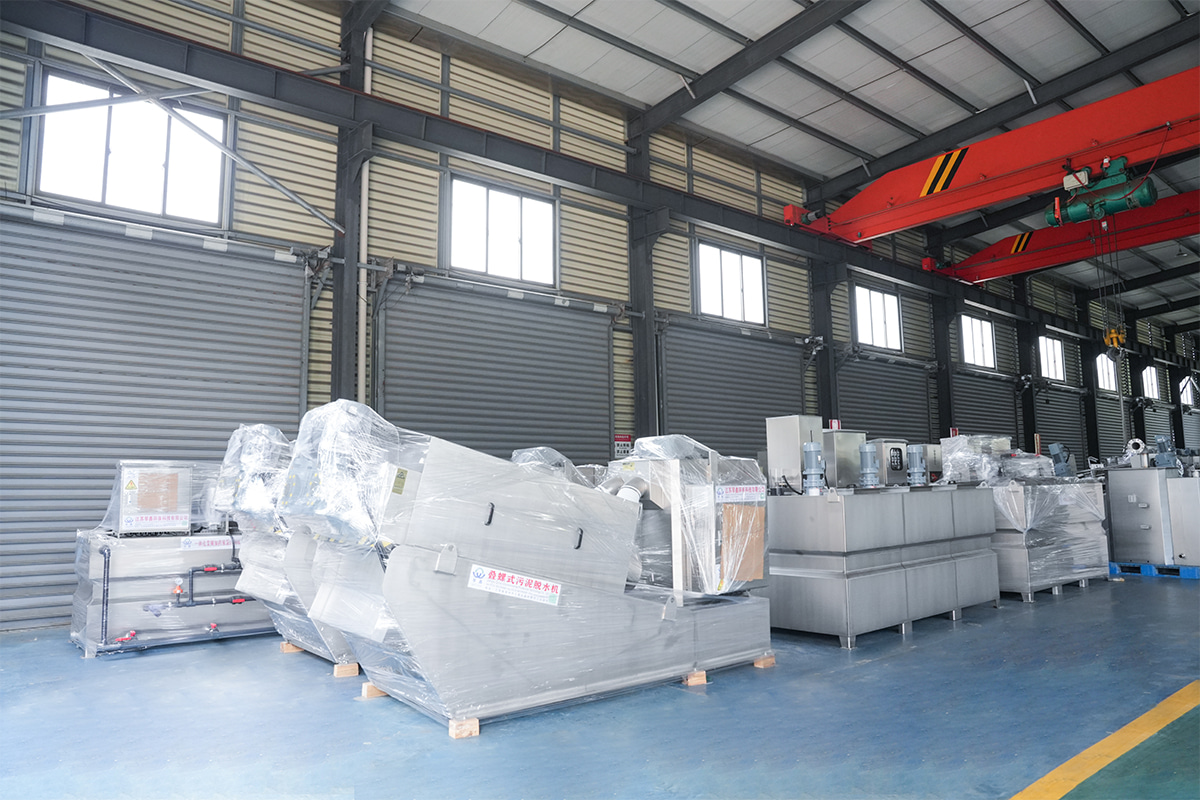
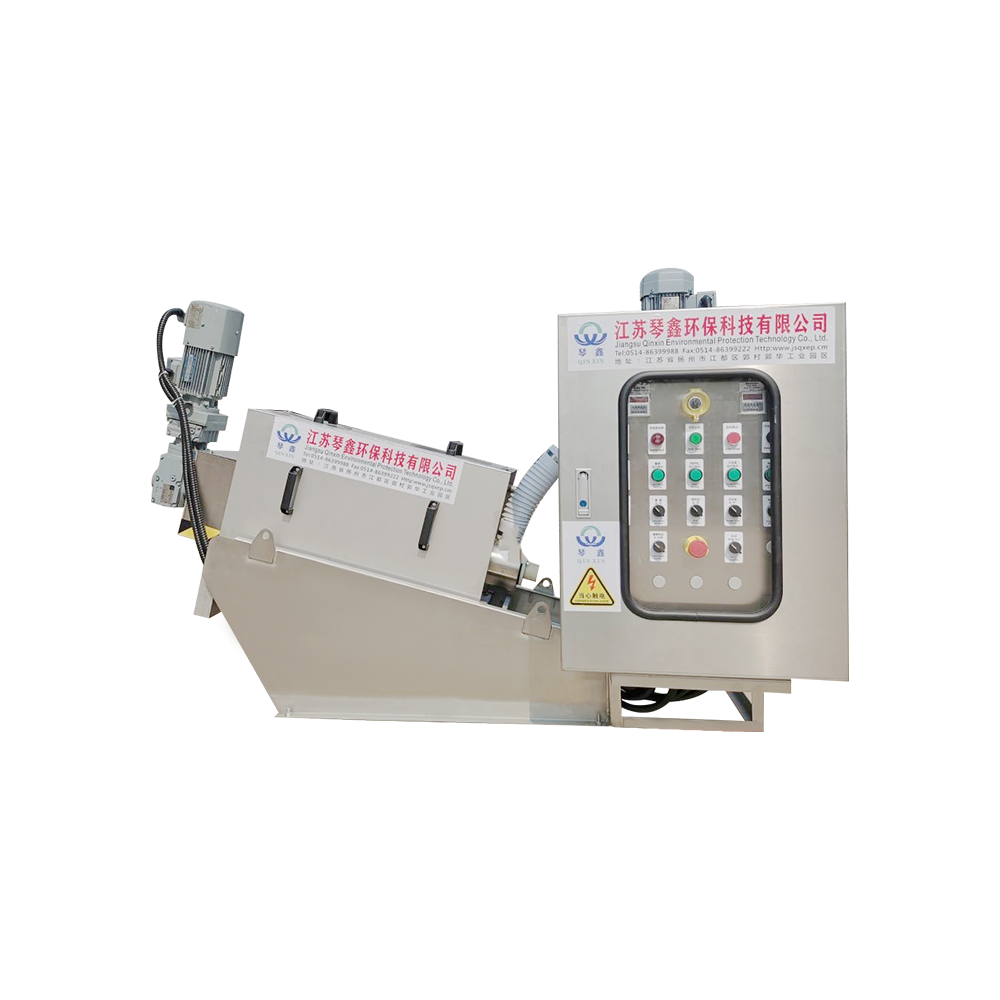
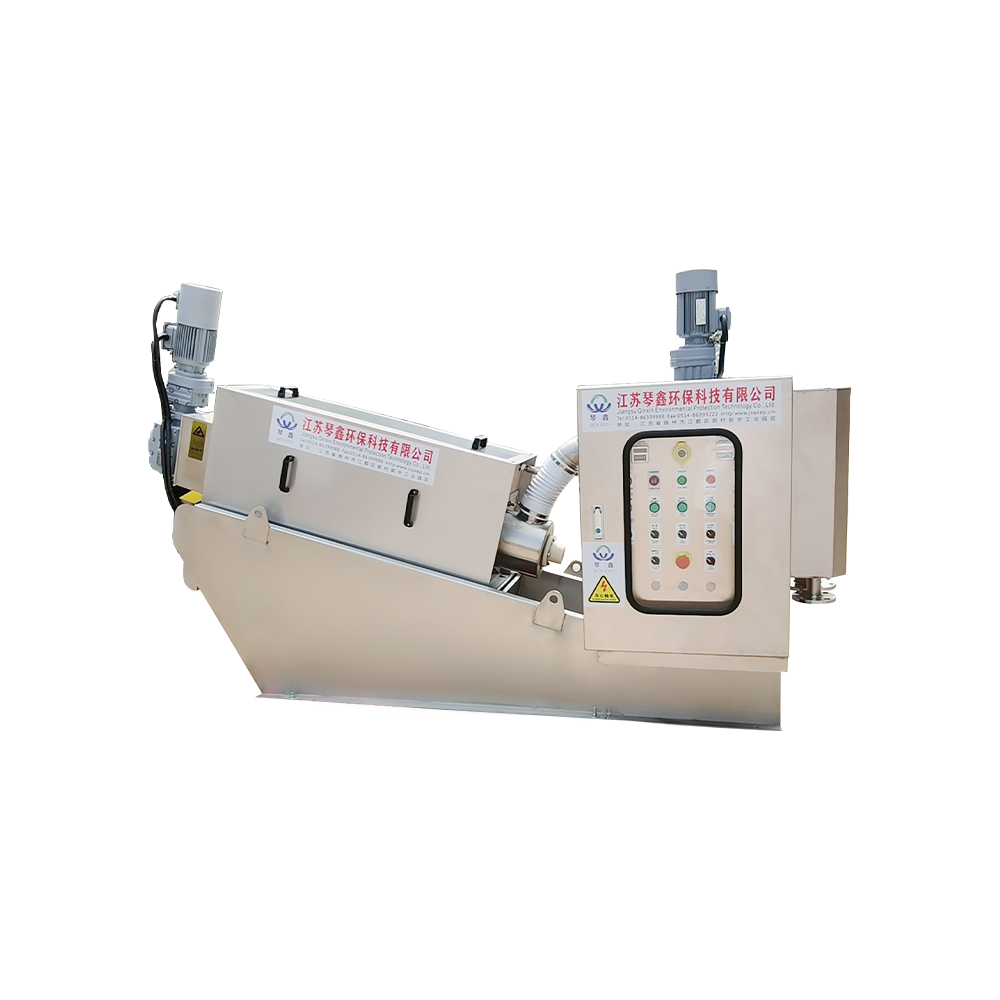
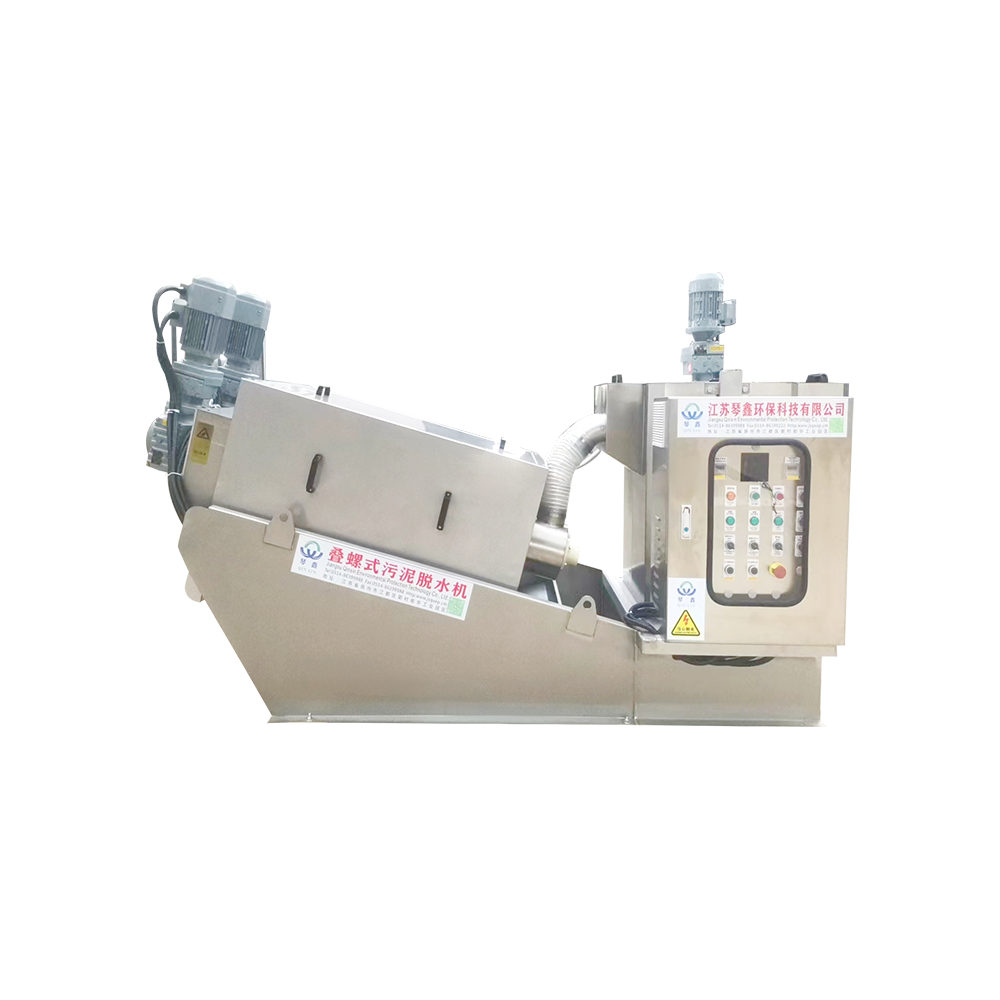
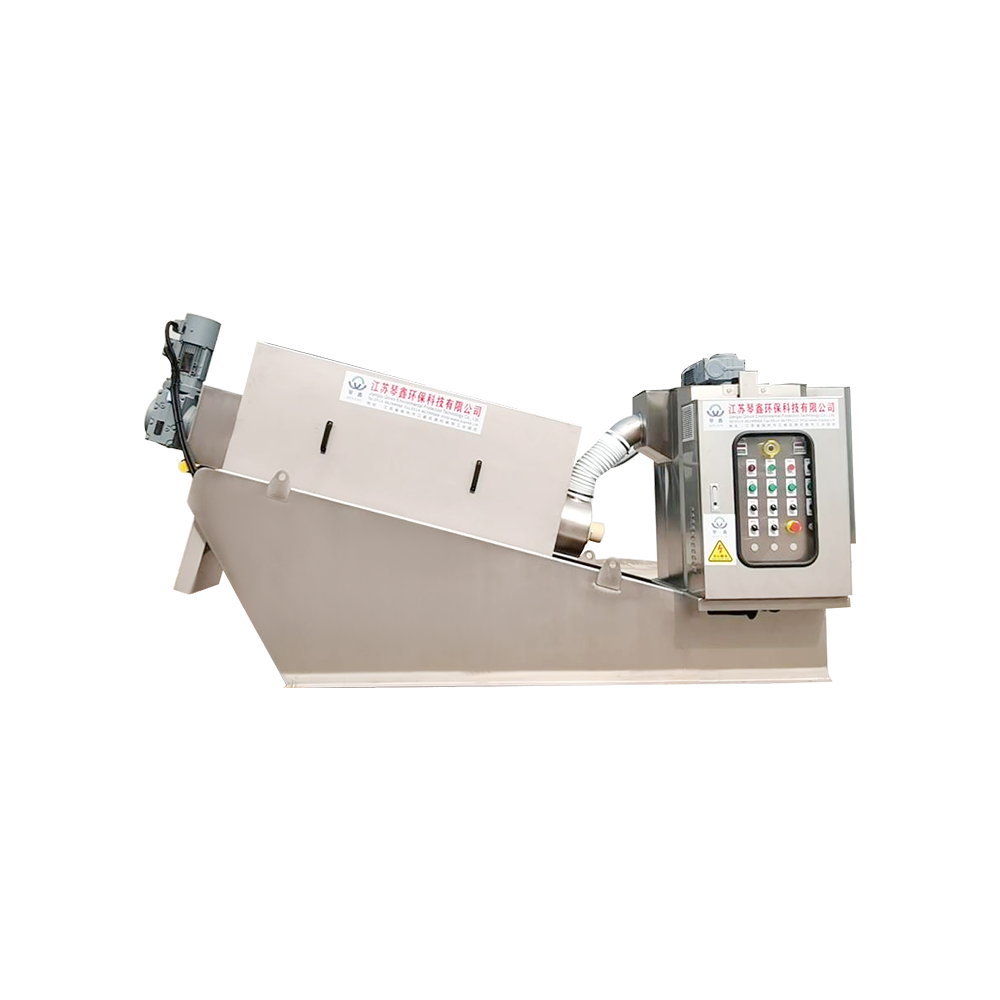
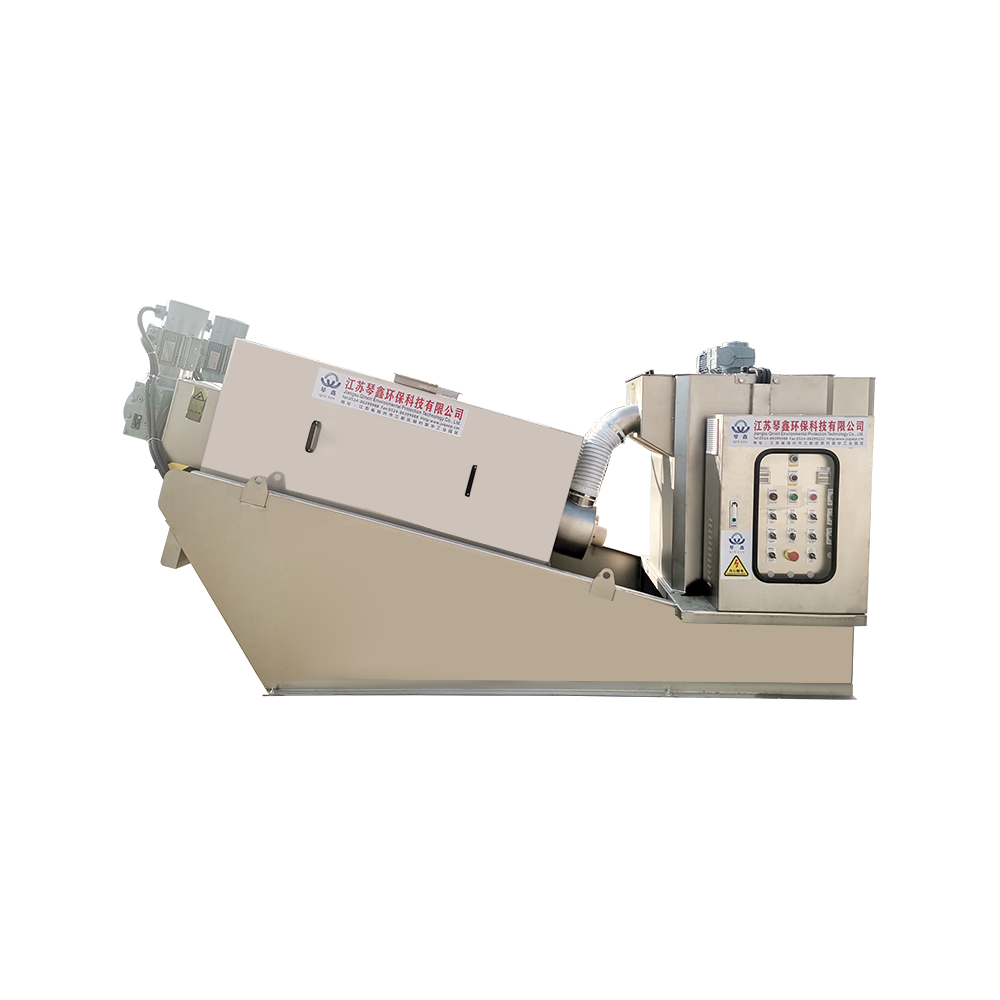

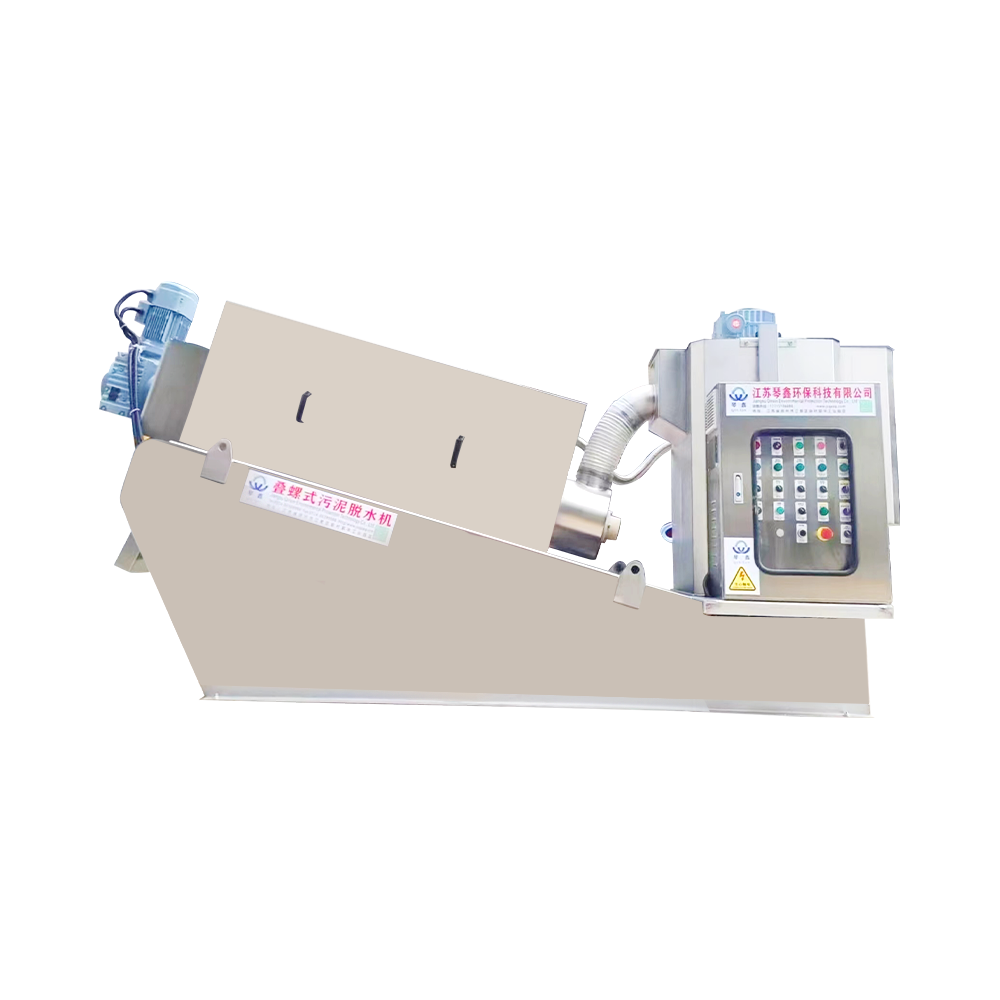

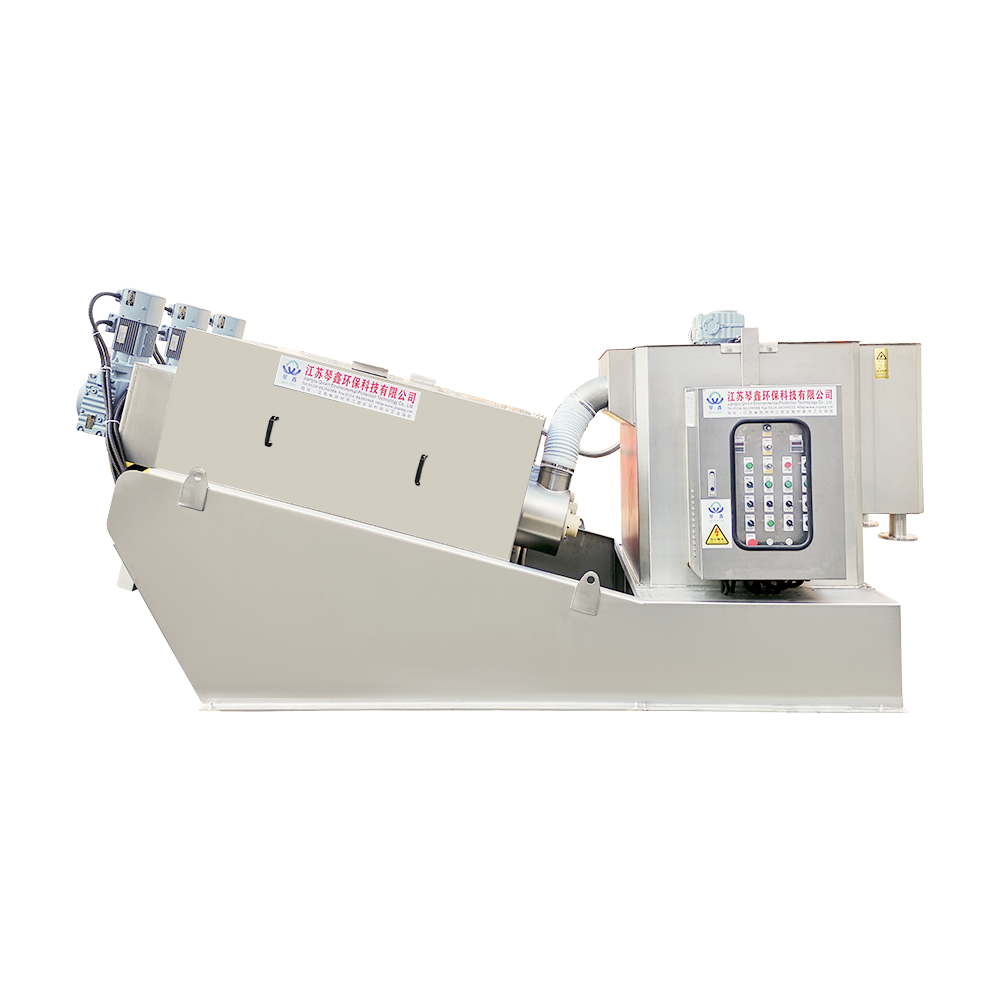
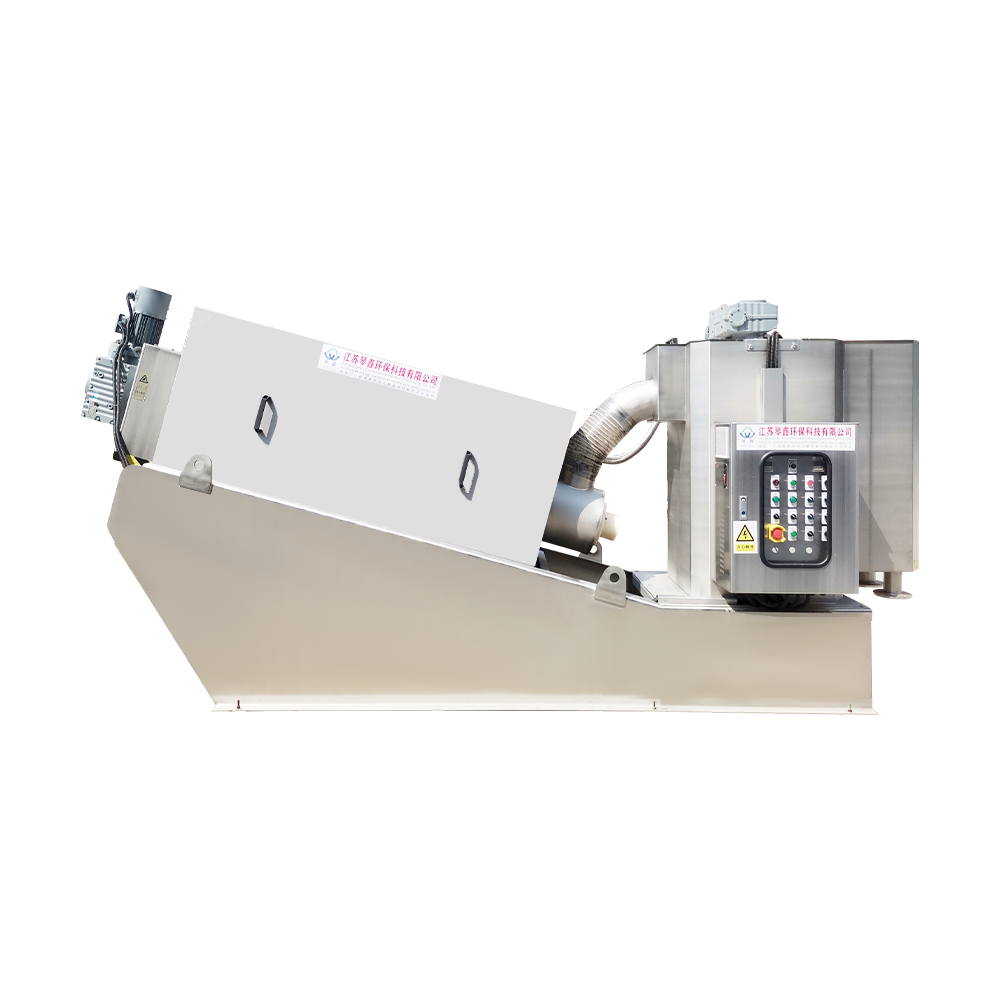
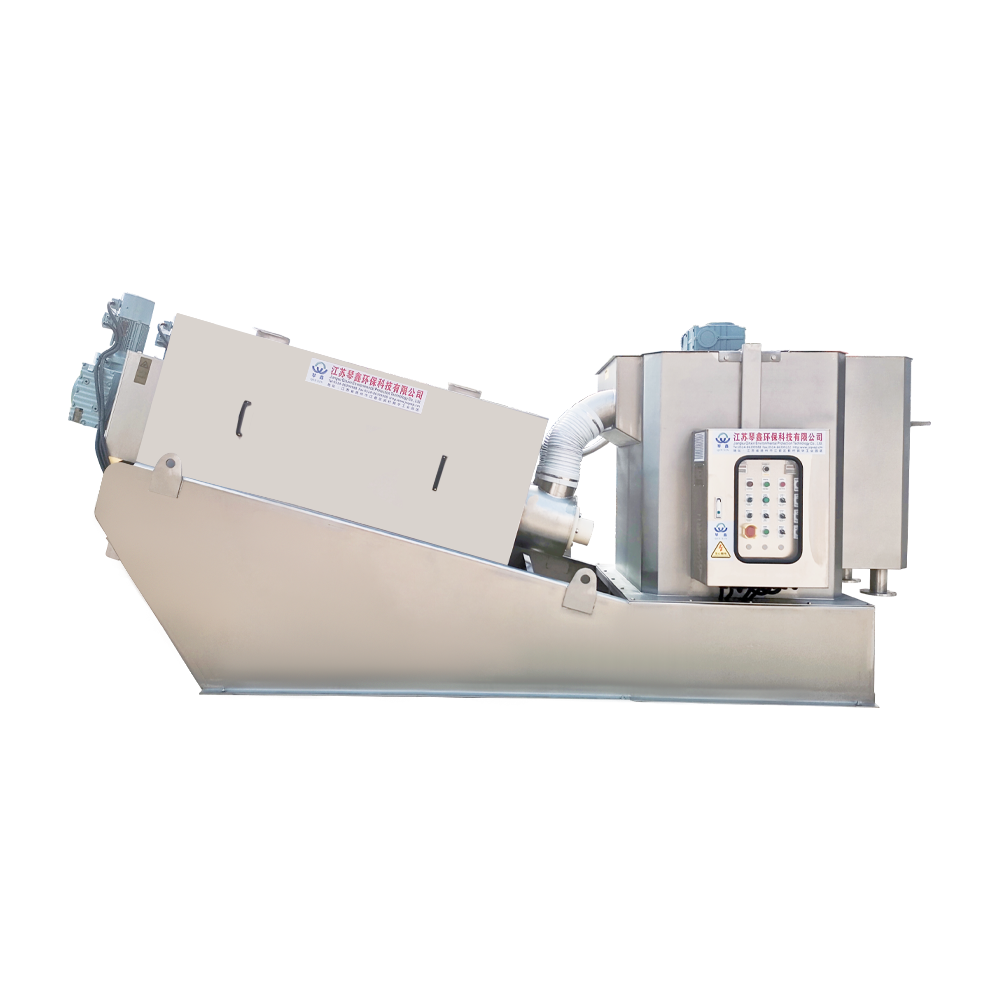
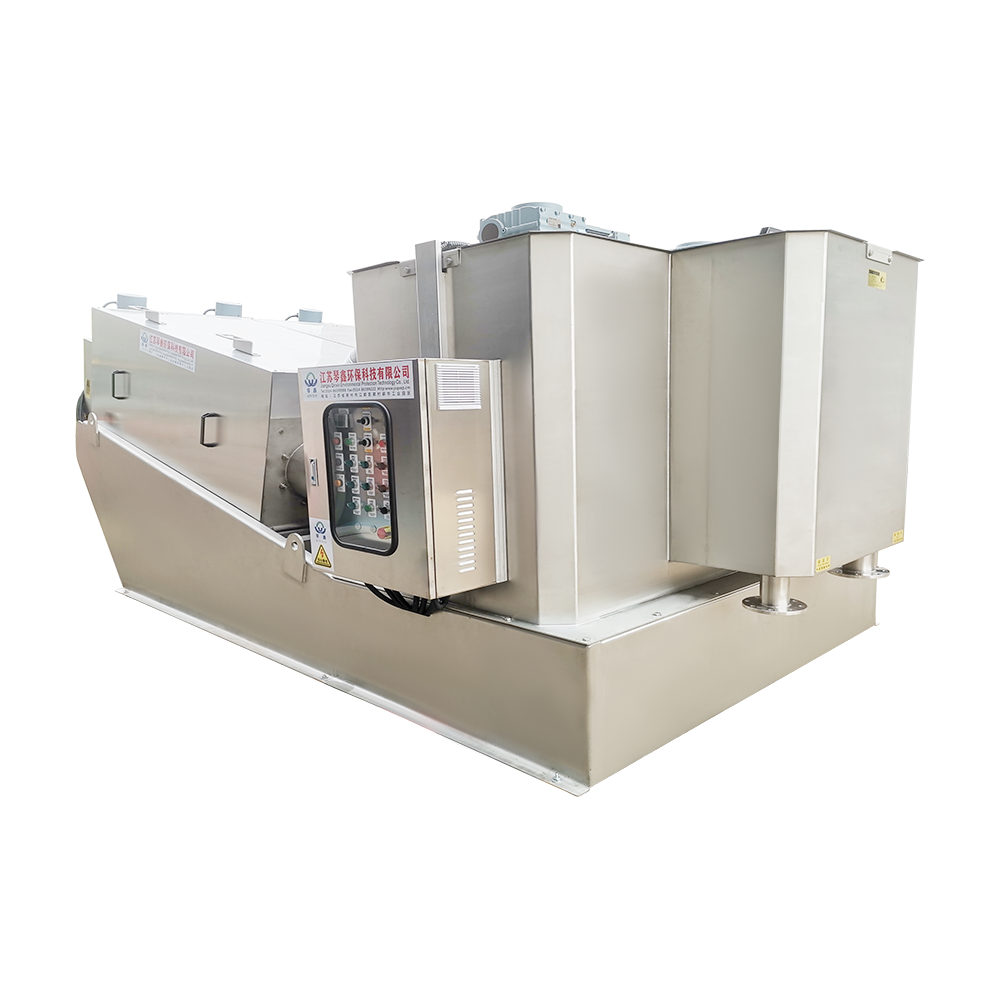
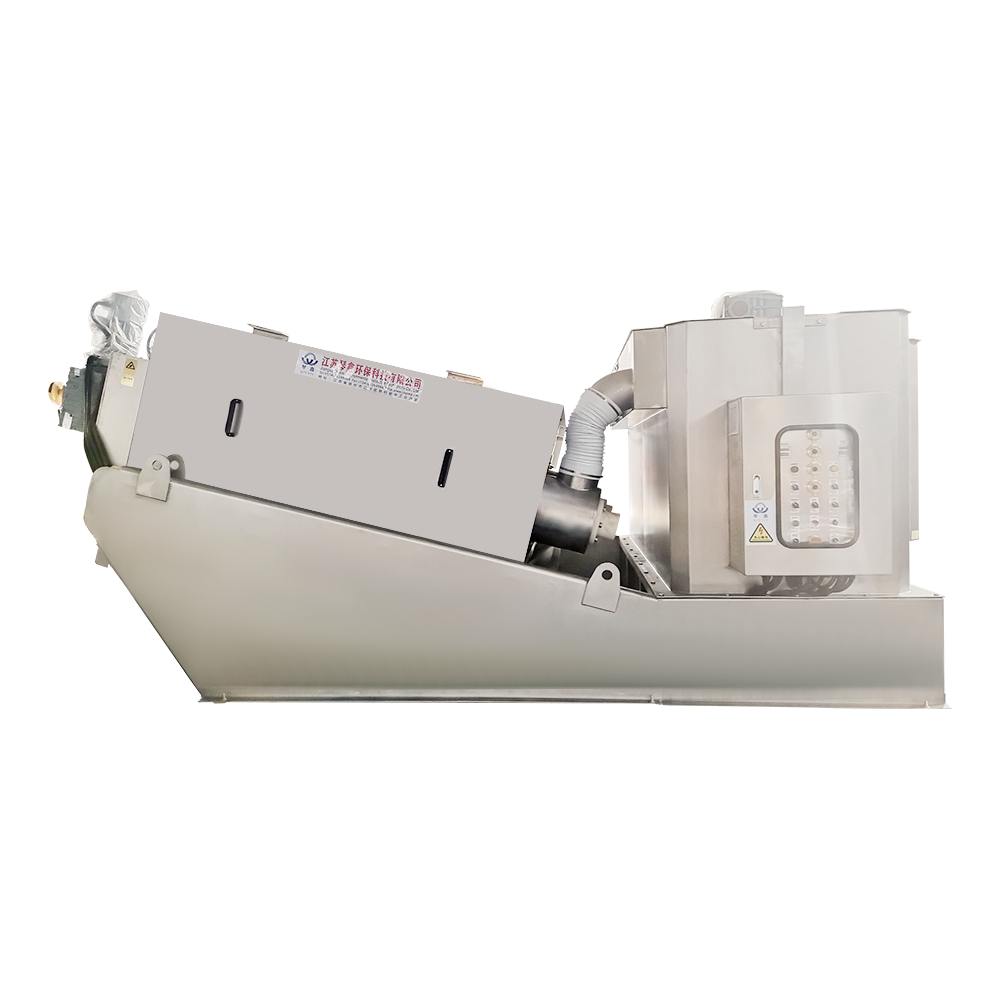
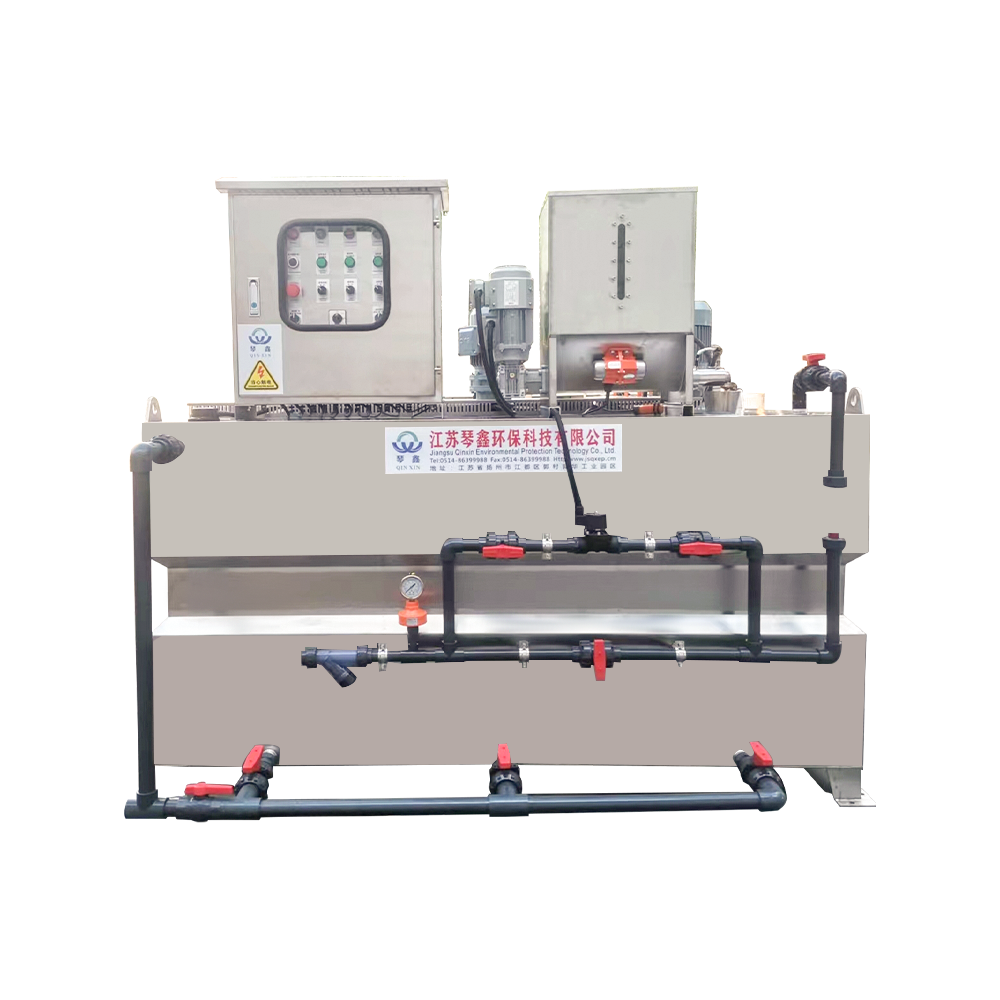

 TOP
TOP